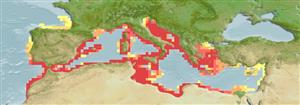Elasmobranchii (tubarões e raias) (sharks and rays) >
Rajiformes (Skates and rays) >
Rajidae (Skates)
Etymology: Raja: Latin, raja, -ae = a sting ray (Raja sp.) (Ref. 45335).
Environment: milieu / climate zone / depth range / distribution range
Ecologia
marinhas demersal; intervalo de profundidade 0 - 700 m (Ref. 127922), usually 20 - 50 m (Ref. 117283). Subtropical; 46°N - 30°N, 10°W - 36°E
Eastern Atlantic: endemic to the Mediterranean but may spread to the Strait of Gibraltar, northern Morocco and possibly south to Mauritania.
Tamanho / Peso / Idade
Maturity: Lm ? range ? - ? cm
Max length : 75.0 cm TL macho/indeterminado; (Ref. 100834); peso máx. Publicado: 2.5 kg (Ref. 100834)
Inhabit inshore waters (Ref. 3167). Depth range to 170 m (Ref. 04426), and from 333-343 m in the eastern Ionian Sea (Ref. 56504). Feed on all kinds of benthic animals (Ref. 3167). Oviparous. Distinct pairing with embrace. Young may tend to follow large objects, such as their mother (Ref. 205). Eggs are oblong capsules with stiff pointed horns at the corners deposited in sandy or muddy flats (Ref. 205). Egg capsules are 4.5 cm long and 3.0 cm wide (Ref. 41304). Minimum depth range (Ref. 114953).
Life cycle and mating behavior
Maturidade | Reprodução | Desova | Ovos | Fecundidade | Larvas
Oviparous, paired eggs are laid. Embryos feed solely on yolk (Ref. 50449). Spawning peak in summer to early autumn with 30 to more than 100 egg-cases per year depending on the size of the female (Ref. 3167). Distinct pairing with embrace. Young may tend to follow large objects, such as their mother (Ref. 205).
McEachran, J.D. and K.A. Dunn, 1998. Phylogenetic analysis of skates, a morphologically conservative clade of elasmobranchs (Chondrichthyes: Rajidae). Copeia 1998(2):271-290. (Ref. 27314)
Categoria na Lista Vermelha da IUCN (Ref. 130435)
Ameaça para o homem
Harmless
Utilização humana
Pescarias: pouco comercial
Mais informação
Idade/TamanhoCrescimentoComprimento-pesoComprimento-comprimentoFrequência de comprimentoMorfometriaMorfologiaLarvasDinâmica larvarRecrutamentoAbundânciaBRUVS
ReferênciasAquaculturaPerfil para aquaculturaEstirpesGenéticaElectrophoresesHereditariedadeDoençasProcessamentoNutrientsMass conversion
Ferramentas
Relatórios especiais
Descarregue XML
Fontes da internet
Estimates based on models
Preferred temperature (Ref.
123201): 13.3 - 15.7, mean 14.3 °C (based on 100 cells).
Phylogenetic diversity index (Ref.
82804): PD
50 = 0.5000 [Uniqueness, from 0.5 = low to 2.0 = high].
Bayesian length-weight: a=0.00251 (0.00207 - 0.00305), b=3.25 (3.21 - 3.29), in cm total length, based on LWR estimates for this species (Ref.
93245).
Nível Trófico (Ref.
69278): 3.8 ±0.6 se; based on diet studies.
Generation time: 2.4 ( na - na) years. Estimated as median ln(3)/K based on 1
growth studies.
Resiliência (Ref.
120179): Baixo, tempo mínimo de duplicação da população 4,5 - 14 anos (Fec assumed to be <100).
Fishing Vulnerability (Ref.
59153): Low to moderate vulnerability (33 of 100).
Climate Vulnerability (Ref.
125649): Moderate to high vulnerability (55 of 100).
Nutrients (Ref.
124155): Calcium = 17 [2, 314] mg/100g; Iron = 0.821 [0.076, 9.969] mg/100g; Protein = 17.5 [14.6, 19.8] %; Omega3 = 0.602 [0.272, 1.402] g/100g; Selenium = 29.3 [5.7, 156.6] μg/100g; VitaminA = 4.39 [0.37, 47.95] μg/100g; Zinc = 0.472 [0.029, 5.467] mg/100g (wet weight);
